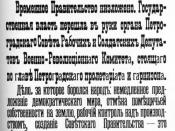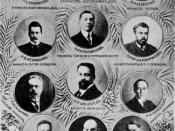Account For the Success of the Bolsheviks in October 1917
At the beginning of 1917 most of the Bolsheviks were in exile but by the end of 1917 the Bolshevik party had not only consolidated control of Moscow and Petrograd, but they were also advancing on the rest of the country. This success was due to several linked factors; the Bolshevik policy of non-cooperation, weakness of the Provisional Government, division of alternative opposition, Lenin's leadership skills, the power of the Petrograd Soviet and Trotsky as its leader, failure on deliver of land reform and the oppressed, armed workers in Petrograd.
Bolshevik success is dictated by whether they met their aims; these included the establishment of a Socialist government over the whole of Russia, which would be ruled by a centralised democracy achieved through a Proletarian Revolution.
Lenin returned from exile in 1917, the same year as the Bolshevik success, which immediately implicates him as vital to the Bolshevik victory.
He was able to allow the Bolshevik Party to gel under his guidance. On his return he launched his April Thesis, calling for 'Peace, Land, Bread and Power to the Soviets.' This was important in gaining the Bolsheviks popular backing, which they lacked during the February Revolution. The language of the April Thesis was simple so that the uneducated mass of the population could easily understand the message. Peace appealed to the soldiers and their families, whilst land appealed to the peasants, power the Soviets pleased the workers and a promise of bread ensured the support of the poor nationwide. Lenin was careful with his language, so as not to alienate working class support, which was key to support of the revolution. Lenin timed the revolution, he decided to act in October, because he cleverly realised that the series...


